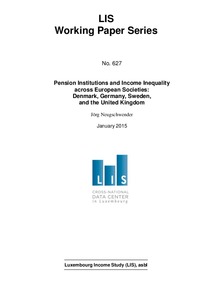Pension institutions and income inequality across European societies: Denmark, Germany, Sweden, and the United Kingdom
"This paper analyses major pension system regulation in four European countries: Denmark, Germany, Sweden, and the United Kingdom. It is focused on the government’s and social partner’s efforts to provide old-age security benefits, and how these regulatory approaches have shaped the current str...
| Main Author: | |
|---|---|
| Institution: | ETUI-European Trade Union Institute |
| Format: | TEXT |
| Language: | English |
| Published: |
Luxembourg
2015
LIS |
| Subjects: | |
| Online Access: | https://www.labourline.org/KENTIKA-19115460124919336429-Pension-institutions-and-incom.htm |
| Summary: | "This paper analyses major pension system regulation in four European countries: Denmark, Germany, Sweden, and the United Kingdom. It is focused on the government’s and social partner’s efforts to provide old-age security benefits, and how these regulatory approaches have shaped the current structure of the public-private mix of pension protection systems. The different regulatory approaches may, in the end, have quite diverse implications on income inequality among the elderly. A historical institutional overview is provided for each of the four countries. The study also used multiple years of cross-sectional data (around 2000 – wave V and mid of 2000s – wave VI) from the Luxembourg Income Study Database to show current outcomes of the different combinations of the public-private mixes. The results showed a strong trend from earlier to later years towards a higher relevance of private pensions in the public-private mix. The Swedish and German systems relied more on employment-related public systems fare better in terms of living standards than the Danish and British systems that combined public minimum pension schemes for a long time only with mostly voluntary occupational systems. Private pensions strongly affected the income position of high-income pensioners. However, also the structure of public pension benefits had a poverty decreasing effect for low-income groups." |
|---|---|
| Physical Description: | 1 v. Digital |

